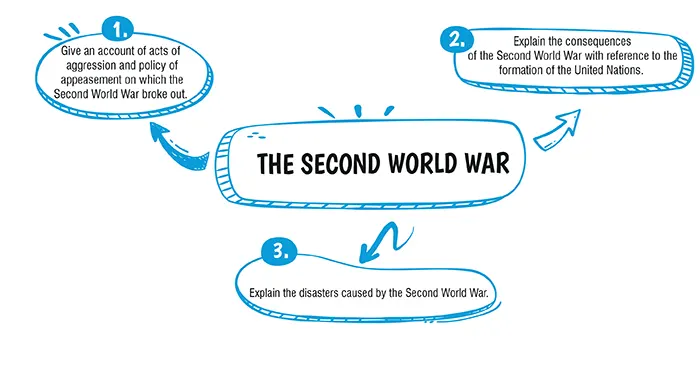Home / Board / ICSE / important Questions / Class 10 / History & Civics / The Second World War
Table of Contents

Ans: (d) All of the above
Explanation
The league took no action against the offending countries when
- Poland seized a part of Lithuania in 1920.
- Japan captured Manchuria (China) in 1931.
- Italy annexed Ethiopia (Africa) in 1936. As a result, many small nations lost faith in the League, and they entered alliances with other countries to protect their interests.
Ans. (b) Berlin–Rome–Tokyo
Explanation:
Japan had joined the Berlin–Rome–Tokyo Axis to further expand its power in the region. It also conquered the British and American territories in China.
Explanation:
When the acts of aggression began, the oppressed countries, the Soviet Union and many leaders in different countries of the world demanded collective action to defeat the aggressor. However, the Western Governments, instead of resisting the aggressions followed a policy of appeasement with the aggressive powers. Appeasement meant a policy of conciliating an aggressive power at the expense of some other country. But for the western countries’ policy of appeasement, Fascism could not have survived as long as it did and would not have been able to unleash the Second World War.
Explanation:
Important leaders prioritised internal cooperation over war and sought to end the war. They were also determined to prevent another such war taking place in future. When the Second World War was still going on, political leaders of twenty six countries including Franklin Roosevelt and Winston Churchill signed a declaration that discouraged entry into any other alliances and that once the war ceased, a formal peacekeeping organisation would be established. This organisation would be called the United Nations and will take measures to prevent hostilities between member countries.
Explanation:
Destruction caused by the Second World War : The Second World War was the most destructive war in history. The main consequences of Second World War are as follows:
(i) Jews were picked up and six million of them were exterminated by the Nazis. Millions of people were transferred to concentration camps and killed.
(ii) People were burnt in gas chambers. There were mass massacres. War prisoners were made to dig mass graves, were shot and then buried in those graves.
(iii) About 5,00,00,000 (fifty million) people perished in the Second World War. About 15,00,000 civilians were killed in air raids during the war. The two Atom Bombs dropped by U.S. aircrafts, killed about 3,20,000 Japanese men, women and children.
(iv) Besides the loss of human lives, the economy and material resources of several nations were badly damaged. Several ancient cities and towns were almost completely destroyed. The total cost of the Second World War has been estimated at a staggering figure of $ 1,384, 9,000,000,000.
(v) The use of Atom Bomb by the U.S. was considered by several people an abominable act, not only because of the number of people that the two atom bombs slaughtered but also because of the very use of the new weapons of mass destruction.
(vi) Anyhow, the prediction of the scientists that the use of the Atom Bomb would lead to a mad race for producing atomic weapons came true. It is not surprising that today there is a race among nations for producing Atom Bombs because of its superiority as a war weapon. The rich and developed nations spend more money in making these bombs today, than for producing or providing medical facilities to its people.
(vii) Political damages :
(a) Germany was divided into two parts—East Germany and West Germany. Russia occupied the eastern part and the Western Germany came under the control of Britain, America and France.
(b) Fascism met its end in Italy. Democracy was established. Militarism came to an end and African colonies were lost.
(c) Military power of Japan was ruined. Democratic Government was set-up.
(d) America and erstwhile U.S.S.R. became powerful nations. The world became divided into two blocks i.e., capitalist and socialist.
In the socialist camp two groups emerged :
(1) The Socialist Russia.
(2) The Communist China.
Download Mind Map of this chapter
Download NowWant to Practice Mock Tests of this chapter
Practice NowDownload Important Questions of this chapter
Download NowCBSE Important Questions Class 10
ICSE Important Questions Class 10
CBSE Important Questions Class 10
ICSE Important Questions Class 10